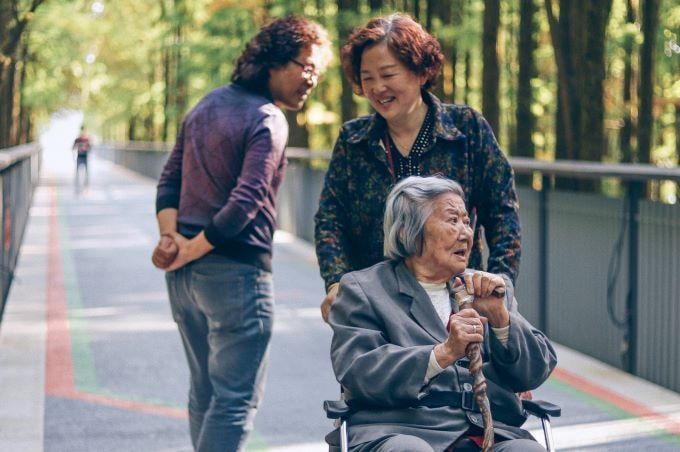Multicultural Elder Care
Learn about the challenges of multicultural elder care with Seniorly. We offer some tips for families who are resistant to the idea of senior care.

Many senior living communities across the US have made it their goal to provide culturally sensitive care to seniors. Some communities are even specifically designed to be comfortable homes for seniors who speak certain languages, have cultural or religious dietary requirements, or unique spiritual needs. In a nation as culturally diverse as the US, this diversity in senior communities is understandable: of course there are Cantonese and Mandarin-speaking senior living communities in the San Francisco area and Spanish-speaking senior communities in Miami, to name just two examples.
But people from some cultures may find it difficult to find senior care that will address their elderly loved one’s needs. Moreover, they may find it difficult to face the idea of an elderly loved one moving into a senior care facility at all.
Cultural resistance to senior care
In many cultures around the world, taking care of elders is expected to be done in the home by family members. The idea of moving seniors into group care homes once they need help with activities of daily living (ADLs), or even more complex daily medical care, is often frowned upon and seen as cold and impersonal, or as a shirking of duty. Many cultures value intergenerational households where grandparents, parents, and children live together until children become adults, marry, and establish their own households (though some might stay even then). In contrast to the US and many Western countries, where seniors usually live alone or with a spouse/partner, when grandparents and family elders in other multi-generational households start to need more help, they are usually already living with kin that can provide that care.
This cultural value, however, is starting to come up against distinct challenges, the largest being the world’s rapidly aging population. The United Nations’ estimates project that the number of people aged 80 and over will triple in the next 30 years, a rapid change that many countries are already feeling the effects of. There are simply more elderly people than there are younger people to care for them. This is due to many factors, particularly to the fact that life expectancies have increased dramatically around the world and will continue to lengthen.
Alongside longer life expectancies, cultural attitudes towards gender norms and the roles of women have shifted around the world. More women work outside the home than ever before, and many have access to reliable birth control. These changes are for the better, of course: just one reason why is that as women gain more opportunities, their countries also grow economically. However in most cultures, historically, women have also been expected to provide most of the caregiving for both children and elders. Now, women might be pursuing careers in cities far away from their parents or grandparents. Or, their income from outside the home might be vital to the financial security of the family, and thus impossible to give up in order to care for elders full-time.
Families from cultures where women are expected to care for children, sick or disabled family members, and elders might face difficult choices as their loved ones age. Women of the family might be busy working or getting an education--the same might be true of the men, as well. A single man who never married or had children and isn’t financially able to retire or take an extended leave from the workforce in order to provide care for his parents has little choice but to pay for their care either at home or in a senior community.
Even when a family is logistically and financially able to provide around the clock care for someone, this can be exhausting, challenging work, even for those who are trained to do it. Not everyone will have the physical or emotional fortitude to offer this level of care, even if they would like to do so.
Navigating a senior care culture clash
Whether for the above reasons or other complex issues unique to your family, you might find yourself in the position of needing help caring for your elderly loved one, even if they or others in your family are resistant to the idea. It may be difficult to convince them that you need help, but we have tips on starting the conversation.
- Lay out the facts: Explain why taking care of your elderly loved one is not feasible. Even now, when so many more jobs offer the ability to work from home, both working and caretaking full time is not realistic. Whatever the reasons — whether your loved one needs advanced care that you don't know how to provide, or if they are bed-bound and you're not strong enough to lift them — they are valid and should be respected.
- Show them the options: Even if you cannot personally care for your loved one, there are still choices available to them and you. Depending on your needs, budget and what's available in your area, you may be able to find in-home care, or take advantage of adult daycare, or find assisted living communities nearby that already know how to care for elders of your culture or religion.
- Keep in mind: Not every assisted living community will have all their details online or in their materials — they may not state in their brochures or website that they are happy to provide kosher meals, or that they are home to other practicing-Buddhist elders. This is why it pays to talk to a local senior advisor: they are the experts on the communities in their area and if they don’t know the answer, they know who to ask.
- Address their fears: Acknowledge that accepting outside help is not the ideal in your family’s culture or traditions. Ask them what they’re most concerned about and see if you can, together, find answers to help assuage their fears.
Your family may never understand your decision to pay for senior care instead of providing it yourself, but you’ll be able to rest easier knowing that you’ve found well-trained and understanding caretakers for your loved one. Professional in-home caregivers and the staff of assisted living and skilled nursing facilities should be trained to be understanding and accommodating of the different cultures and practices of their resident seniors.
It might be easier to find some kinds of specialized care than others. For example, though there are many different types of Christian senior communities around the country, and some Jewish ones, there are few, if any, communities designed for Muslim seniors (one report from 2011 states that there are none). Fortunately, some communities are starting to offer halal meals, facilitate Friday prayers, and even keep Muslim doctors and therapists on staff. And the American Muslim Seniors Society was founded in 2017 to both offer support to Muslim families and to try and change negative cultural perceptions of senior care.
Consider doing some research to find local cultural centers or organizations like the American Muslim Seniors Society that share your families values and can help you find quality care for your loved one.
Content Contributor at Seniorly
To learn more about Seniorly's editorial guidelines, click here.
Sign up for our Healthy Aging Handbook
Seniorly’s Senior Living advisors created a comprehensive handbook to help people age happily while ensuring they love where they live. Enter your email address below to receive your copy and learn more about Healthy Aging and Senior Living.*
*By submitting your email address above, you consent to receive occasional email communications from Seniorly, including educational content and tips, newsletters, and other relevant updates and offerings. You can unsubscribe at any time and we will never sell or distribute your email address to a third party. You can view our Privacy Policy here.
